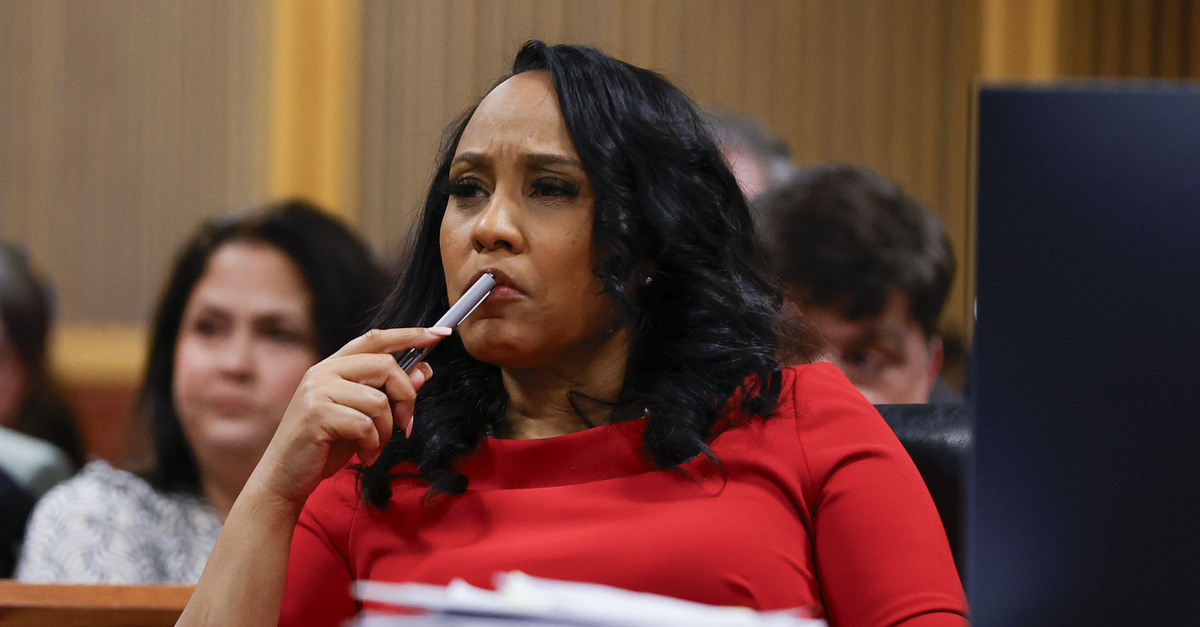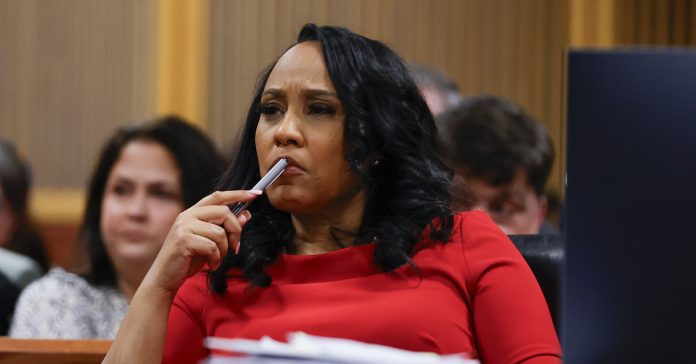
Fulton County District Attorney Fani Willis looks on during a hearing on the Georgia election interference case, Friday, March, 1, 2024, in Atlanta. (AP Photo/Alex Slitz, Pool)
The drip of revelations about the romantic relationship between Fulton County District Attorney Fani Willis and special prosecutor Nathan Wade continued on Tuesday morning with yet another potential witness being offered by the defense.
A motion for proposed testimony filed by co-defendant Cathy Latham, the former Coffee County GOP chair who is embroiled in the fake electors plot, claims Atlanta-based attorney Manny Arora had conversations concerning the timeline of the Willis and Wade affair.
The former prosecutor and law professor, who is now a defense attorney, was repeatedly told the prosecutors struck up their romance years before the pair have testified it started, the filing alleges.
But as the would-be evidence mounts against the prosecutors in charge of the racketeering (RICO) case against Donald Trump, there is no clear indication of its value at this stage in the proceedings, legal experts say. There is also the open question of whether the judge overseeing the case will even consider the latest allegations when deciding the broader motion to disqualify the prosecutorial team.
The potential issue with the filing prepared by attorney William G. Cromwell is that it sources Arora’s knowledge to conversations with Terrence Bradley, Wade’s former divorce lawyer and law partner.
“Between September through October 2023, Mr. Arora had several conversations with attorney Terrence Bradley regarding the relationship between District Attorney Wills and Nathan Wade,” the latest motion reads.
Arora says Bradley told him Wade and Willis “had definitely begun a romantic relationship” during the time in which the district attorney was first campaigning for her job between 2019 and 2020.
Bradley, however, has testified that his knowledge about the relationship was based on a lone conversation with Wade and, ultimately, nothing more than speculation. And, he adamantly refused under oath to offer anything close to a date for when the relationship turned romantic. In text messages, Bradley previously told defense attorney Ashleigh Merchant, who represents co-defendant Michael Roman, that the affair began when Willis was a municipal court judge — which, again, dates it to having started between 2019 and 2020.
A similar motion, citing conversations with Bradley, was filed on Monday by co-defendant David Shafer, the onetime Georgia GOP chair who prosecutors claim was also part of the fake electors plot. That earlier motion offered the potential testimony of Co-Chief Deputy District Attorney for Cobb County Cindi Lee Yeager.
But the provenance of both Yeager’s and Arora’s would-be testimony might preclude Fulton County Superior Court Judge Scott McAfee from considering the motions filed by defense attorneys this week.
Bradley, during two times on the stand — and despite being previewed as the “star witness” for the defense by McAfee — did not deliver much in the way of concrete testimony. In the end, the state and even some defense attorneys questioned Bradley’s credibility.
“I absolutely believe Manny Arora and Cindi Lee Yeager that Terrance Bradley was telling them all sorts of juicy and damning things about Willis and Wade, and their testimony would absolutely impeach Bradley as a liar,” Georgia State College of Law Professor Anthony Michael Kreis posted on X (formerly Twitter) on Tuesday. “But, what do we do beyond that with it? I’m less sure.”
Both motions citing Yeager and Arora could also be viewed as cumulative by the judge, according to Atlanta-area attorney Esther S. McDonald, who also shared her thoughts on the latest filings on X.
Testimony generally seems relevant only to show Bradley lied about not having personal knowledge, and IMO he was already effectively impeached on that. Yeager statement on Willis could be relevant for impeachment if one or both testified they didn’t talk about relationship.
— Esther S. McDonald (@esmcdonald) March 5, 2024
The term “cumulative” in law is related to the rules of evidence and simply means “more of the same” or repetitive.
One point raised in the Yeager filing that might force McAfee’s hand is a statement attributed to Willis herself, McDonald noted.
In the earlier motion, Yeager said she overheard the district attorney speaking with Bradley on the phone and instructing him not to speak to the press about Wade. During his own testimony, Bradley more or less denied ever having conversations with Willis over the phone.
The Latham motion citing Arora could also push the court to reopen evidence in the disqualification hearing on a discrete and highly-contested point: by imputing personal knowledge of the relationship — exactly what Bradley said under oath he did not have — to Bradley.
While McAfee might view the Arora testimony as repetitive, the Latham motion includes reference to a small detail about how Wade and Willis maintained their largely secret relationship.
“Mr. Bradley stated that he had personal knowledge of the relationship between Mr. Wade and district Attorney Wills, including details regarding the use of Ms. Robin Yeartie’s apartment such as Mr. Wade’s having a garage opener to the property,” the motion reads.
During the hearings, both the prosecutors and the defense addressed claims that Willis and Wade used a condominium she rented from Yeartie as a romantic meetup location. Cellphone records legally obtained by the defense suggest Wade visited the condo on numerous occasions and likely spent the night there on two occasions prior to the admitted time when the relationship became romantic.
The garage door opener issue is not new, but was only briefly addressed by the defense during a hearing last week.
“I’ve never seen a garage door opener,” Bradley told Merchant. “I’ve never been to Ms. Willis’ house. I’ve never been, so no I do not have any personal knowledge of him having a garage door opener.”
Have a tip we should know? [email protected]

